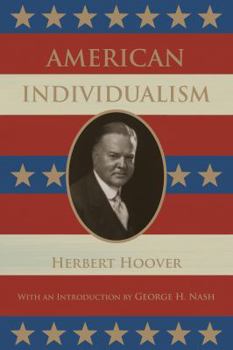American Individualism
Select Format
Select Condition 
Book Overview
In late 1921, then secretary of commerce Herbert Hoover decided to distill from his experiences a coherent understanding of the American experiment he cherished. The result was the 1922 book American Individualism. In it, Hoover expounded and vigorously defended what has come to be called American exceptionalism: the set of beliefs and values that still makes America unique. He argued that America can make steady, sure progress if we preserve our individualism, preserve and stimulate the initiative of our people, insist on and maintain the safeguards to equality of opportunity, and honor service as a part of our national character. American Individualism asserts that equal opportunity for individuals to develop their abilities is "the sole source of progress" and the fundamental impulse behind American civilization for three--now four--centuries. More than ninety years have passed since this book was first published; it is clear, in retrospect, that the volume was partly motivated by the political controversies of the time. But American Individualism is not simply a product of a dim and receding past. To a considerable degree the ideological battles of Hoover's era are the battles of our own, and the interpretations we make of our past--particularly the years between 1921 and 1933--will mold our perspective on the crises of the present.
Format:Paperback
Language:English
ISBN:0817920153
ISBN13:9780817920159
Release Date:December 2016
Publisher:Hoover Institution Press
Length:100 Pages
Weight:1.40 lbs.
Dimensions:0.4" x 4.4" x 6.9"
Customer Reviews
2 ratings
Hoover - ahead of his times
Published by Thriftbooks.com User , 24 years ago
Although it is quite popular among historians and the media to portray Hoover in a negative light, this book evidences Hoover's thoughtfulness and brilliance that places him among the U.S.'s best minds of the time. Hoover details his theories of the regimentation of government, in a foresightful and eloquent manner. The book is in some ways a "groundbreaking" work that provides insight into the downsides of many of the depression-era "new deal" reforms. Hoover's economic philosophies have been traditionally neglected among historians and he has unjustifiably served as a scapegoat for the Great Depression and the excesses of the Roaring Twenties. Hoover presents in this book a survey of the alternatives to the American System of economic and political liberty and warns of the many dangers associated with government's entry into competitive markets. His concern for the protection of individual economic liberties serves as a bedrock upon which Friedman and others expanded many decades later. For supporters of Reaganesque philosophies who seek a unique historical perspective or for those interested in a minority perspective during the 1930s, this book is an underrecognized, underrated must-read!
Excellent because it is so surprising!
Published by Thriftbooks.com User , 25 years ago
I found this book surprising. I did because before reading this and all of Hoover's books, my view of him was largely based on the theme song from the TV show, "All in the Family." My views of the man also came mainly from the idea that Hoover, and he alone, was the cause of the Great Depression. This book, and his others are exciting to me because they are so contrary to what I thought I knew.





